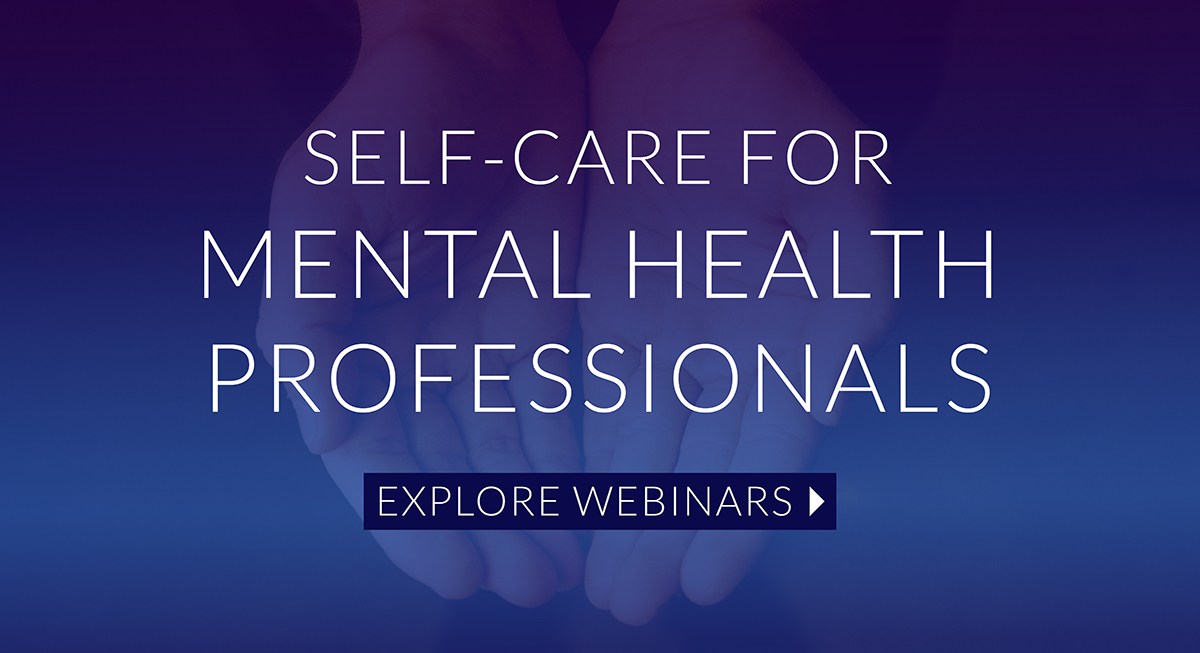
 Cummings Graduate Institute for Behavioral Health Studies (CGI) in partnership with Sala Hilaire, LCSW, MAC, CAMS, CGP and Vickie Ogunlade, PhD, LCSW of the Healing Consultants LLC proudly offers a new continuing education webinars on the topic of self-care for mental health providers.
Cummings Graduate Institute for Behavioral Health Studies (CGI) in partnership with Sala Hilaire, LCSW, MAC, CAMS, CGP and Vickie Ogunlade, PhD, LCSW of the Healing Consultants LLC proudly offers a new continuing education webinars on the topic of self-care for mental health providers.
This 3-part webinar series invites mental health professionals to explore self-care, while understanding the need to practice skills related to the mind, body and spirit and the impact of stress, fatigue, and trauma. Participants will gain insights germane to the ethical responsibility of self-care practice. Several approaches to managing stress will be identified. Practical skills will be highlighted. Each participant will have the opportunity to create a wellness toolbox and a personal self-care plan in support of their mental health.
All webinars in the Self-Care for Mental Health Professionals: 3-Part Self-Study series are available on-demand and are eligible for ASWB and NBCC CE credits.
- Part 1: Emotional Self-Care
- Part 2: Physical Self-Care
- Part 3: Spiritual Self-Care
Webinars in the Self-Care for Mental Health Professionals series are available a la carte or as a bundle, which offers cost savings.
Self-Care for Mental Health Professionals: 3-Part Self-Study
Part 1 – Emotional Self-Care
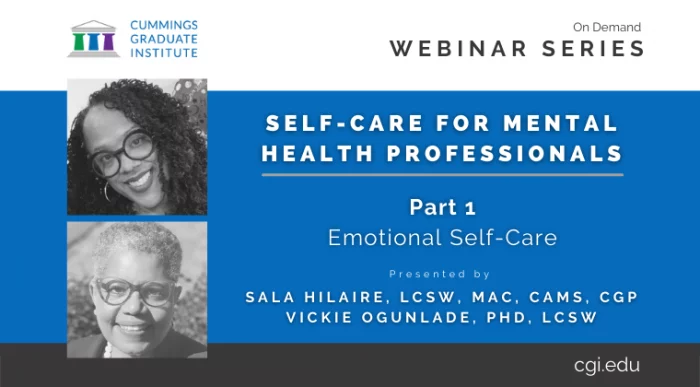
- Learning Objectives:
- Recognize the importance of self-care as a mental health professional.
- Identify the ethical responsibility in the practice of self-care, with a focus on various codes of ethics for mental health professionals.
- Recognize the need to practice emotional self-care in relationship to stress, fatigue, trauma.
- Identify at least one model of a self-care plan and 3 practices to support emotional health.
- CE Credit Approvals: One (1) hour of CE credit, provided by the Association of Social Work Boards (ASWB) Approved Continuing Education (ACE) program. One (1) hour of CE credit provided by the National Board for Certified Counselors (NBCC).
- Webinar Audience: This webinar was designed for mental health professionals, Psychiatrists, Social Workers, Licensed Professional Counselors, Therapists, Caregivers, Nurses, Community Health Workers, Psychologists, etc. Credentials are not required to enroll, anyone is welcome to participate in the online course.
- Content Level: Beginner
- Cost: $20 USD for the individual webinar or $50 for the bundle which includes all 3 webinars
- Course delivery: Online, on-demand
- Interaction: Asynchronous, Non-Interactive
- Access: 365 days from date of purchase
- Requirements to obtain CE: Watch entire webinar recording; complete course evaluation & posttest.
- Posttest: Obtain an 80% minimum score. You can retake the test as needed to achieve a qualifying score.
- Evaluation: At the completion of the webinar a course evaluation will be available for completion.
- Certificate award process: A certificate of completion will be provided by Cummings Graduate Institute for Behavioral Health Studies. The certificate will be available for immediate download.
To learn more about the webinar, click here.
Sign- up for Part 1
Self-Care for Mental Health Professionals: 3-Part Self-Study
Part 2 – Physical Self-Care
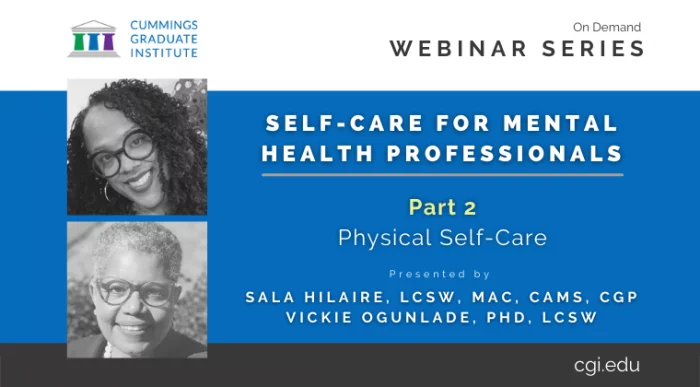
- Learning Objectives:
- Recognize the importance of self-care as a mental health professional.
- Identify the ethical responsibility in the practice of self-care, with a focus on various codes of ethics for mental health professionals.
- Recognize the need to practice physical self-care in relationship to stress, fatigue, trauma.
- Identify at least one model of a self-care plan and 3 practices to support physical health.
- CE Credit Approvals: One (1) hour of CE credit, provided by the Association of Social Work Boards (ASWB) Approved Continuing Education (ACE) program. One (1) hour of CE credit provided by the National Board for Certified Counselors (NBCC).
- Webinar Audience: This webinar was designed for mental health professionals, Psychiatrists, Social Workers, Licensed Professional Counselors, Therapists, Caregivers, Nurses, Community Health Workers, Psychologists, etc. Credentials are not required to enroll, anyone is welcome to participate in the online course.
- Content Level: Beginner
- Cost: $20 USD for the individual webinar or $50 for the bundle which includes all 3 webinars
- Course delivery: Online, on-demand
- Interaction: Asynchronous, Non-Interactive
- Access: 365 days from date of purchase
- Requirements to obtain CE: Watch entire webinar recording; complete course evaluation & posttest.
- Posttest: Obtain an 80% minimum score. You can retake the test as needed to achieve a qualifying score.
- Evaluation: At the completion of the webinar a course evaluation will be available for completion.
- Certificate award process: A certificate of completion will be provided by Cummings Graduate Institute for Behavioral Health Studies. The certificate will be available for immediate download.
To learn more about the webinar, click here.
Sign-up for Part 2
Self-Care for Mental Health Professionals: 3-Part Self-Study
Part 3 – Spiritual Self-Care
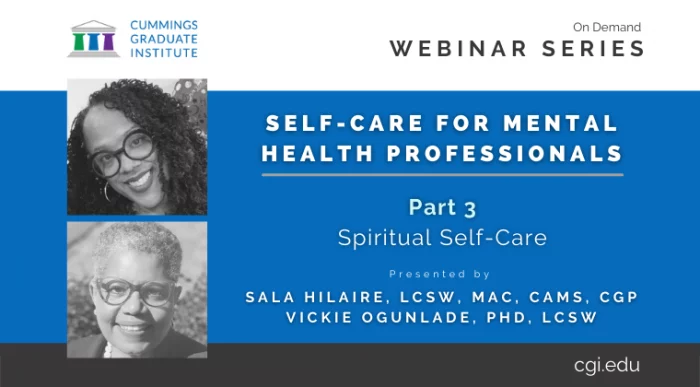
- Learning Objectives:
- Recognize the importance of self-care as a mental health professional.
- Identify the ethical responsibility in the practice of self-care, with a focus on various codes of ethics for mental health professionals.
- Recognize the need to practice spiritual self-care in relationship to stress, fatigue, trauma.
- Identify at least one model of a self-care plan and 3 practices to support spiritual health.
- CE Credit Approvals: One (1) hour of CE credit, provided by the Association of Social Work Boards (ASWB) Approved Continuing Education (ACE) program. One (1) hour of CE credit provided by the National Board for Certified Counselors (NBCC).
- Webinar Audience: This webinar was designed for mental health professionals, Psychiatrists, Social Workers, Licensed Professional Counselors, Therapists, Caregivers, Nurses, Community Health Workers, Psychologists, etc. Credentials are not required to enroll, anyone is welcome to participate in the online course.
- Content Level: Beginner
- Cost: $20 USD for the individual webinar or $50 for the bundle which includes all 3 webinars
- Course delivery: Online, on-demand
- Interaction: Asynchronous, Non-Interactive
- Access: 365 days from date of purchase
- Requirements to obtain CE: Watch entire webinar recording; complete course evaluation & posttest.
- Posttest: Obtain an 80% minimum score. You can retake the test as needed to achieve a qualifying score.
- Evaluation: At the completion of the webinar a course evaluation will be available for completion.
- Certificate award process: A certificate of completion will be provided by Cummings Graduate Institute for Behavioral Health Studies. The certificate will be available for immediate download.
To learn more about the webinar, click here.
Sign-up for Part 3
Webinars in the Mental Health Professionals: 3-Part Self-Study are available a la carte or as a bundle, which offers cost savings.
Sign-up for the webinar bundle and save.
About the Subject Matter Experts & Facilitators
The Self-Care for Mental Health Professionals: 3-Part Self-Study webinar series is designed and facilitated by Sala Hilaire, LCSW, MAC, CAMS, CGP and Dr. Vickie Ogunlade, PhD, LCSW.
 About Sala Hilaire, LCSW, MAC, CAMS, CGP
About Sala Hilaire, LCSW, MAC, CAMS, CGP
Sala is a Licensed Clinical Social Worker, Master Addiction Counselor, Certified Anger Management Specialist and a Certified Grief Informed Professional. She offers counseling services to individuals across the life cycle, including young adults, couples, transitioning teens, and families. Her practice philosophy is to treat the “whole person,” addressing each client’s physical, emotional, social, spiritual, and cultural needs. She does this by creating and promoting conditions conducive to personal growth and development. Sala provides solution-focused treatment using Mindfulness interventions that aim to help individuals attain optimal functioning at home, school, work and in society. Additionally, Sala’s clinical expertise includes working with individuals experiencing grief, stress, survivors of emotional and physical abuse/trauma, and with the LGBTQIA+ community members. She is skilled in the arena of workshop development, program development, and the facilitation of therapeutic groups and conferences. Sala has over 30 years of clinical and management experience.
 About Vickie Ogunlade, PhD, LCSW
About Vickie Ogunlade, PhD, LCSW
Vickie Ogunlade is a Licensed Clinical Social Worker, with a PhD in Social Work Policy, Planning and Administration, and a Certification in Mindfulness Based Stress Reduction. Initiated over 35 years ago, her practice has focused on young adults, family systems and seniors, with respect for cross-cultural diversity and inclusion, and clients’ spirituality. Vickie has provided clinical and administrative services impacting various arenas, which included medical, psychiatric and in- home settings, as well as higher education. Dr. Ogunlade’s practice has included presentations, as well as the facilitation of conference workshops and seminars, within the United States and Nigeria. With a deep sensitivity to cross-cultural and spiritual perspectives, she has taken part in onsite support of Nigerian village projects from a family system perspective, in addition to lecturing as an adjunct at Babcock University, while in Nigeria. She is deeply committed to the counseling process for the development and stability of inner peace and emotional, physical, and spiritual well-being, amid the life experience. The practice of stress reduction mindfulness is a key element of her clinical, administrative, and consultative processes.
Continuing Education Accreditation
 Association of Social Work Boards (ASWB)
Association of Social Work Boards (ASWB)
Cummings Graduate Institute for Behavioral Health Studies [#1796], is approved to offer social work continuing education by the Association of Social Work Boards (ASWB) Approved Continuing Education (ACE) program. Organizations, not individual courses, are approved as ACE providers. State and provincial regulatory boards have the final authority to determine whether an individual course may be accepted for continuing education credit. Cummings Graduate Institute for Behavioral Health Studies maintains responsibility for this course. ACE provider approval period: [1/27/2022 – 1/27/2023]. Social workers completing this course receive [one] hour of [CE] continuing education credit.
National Board for Certified Counselors (NBCC)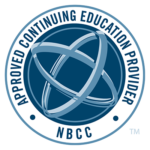
Cummings Graduate Institute for Behavioral Health Studies has been approved by NBCC as an Approved Continuing Education Provider, ACEP No. 7174. Programs that do not qualify for NBCC credit are clearly identified. Cummings Graduate Institute for Behavioral Health Studies is solely responsible for all aspects of the programs.
About Continuing Education at CGI
Accommodations: All videos are closed-captioned. Individuals needing other accommodations should contact continuinged@cgi.edu or call (480) 285-1761, ext. 3
Grievances: To alert us to a problem or concern, please complete a Grievance Form. We value your input and hope to resolve any issues in a timely manner.
Refunds: Your satisfaction is important. However, we have a no refund policy. By using and or purchasing our program, you understand and agree all sales are final.
To explore CGI’s full catalog of continuing education offerings, visit: https://cgi.thinkific.com
Sign-up for our continuing education newsletter to learn about new offerings.
Questions
Questions about webinars and continuing education offerings at CGI can be directed to continuinged@cgi.edu.































